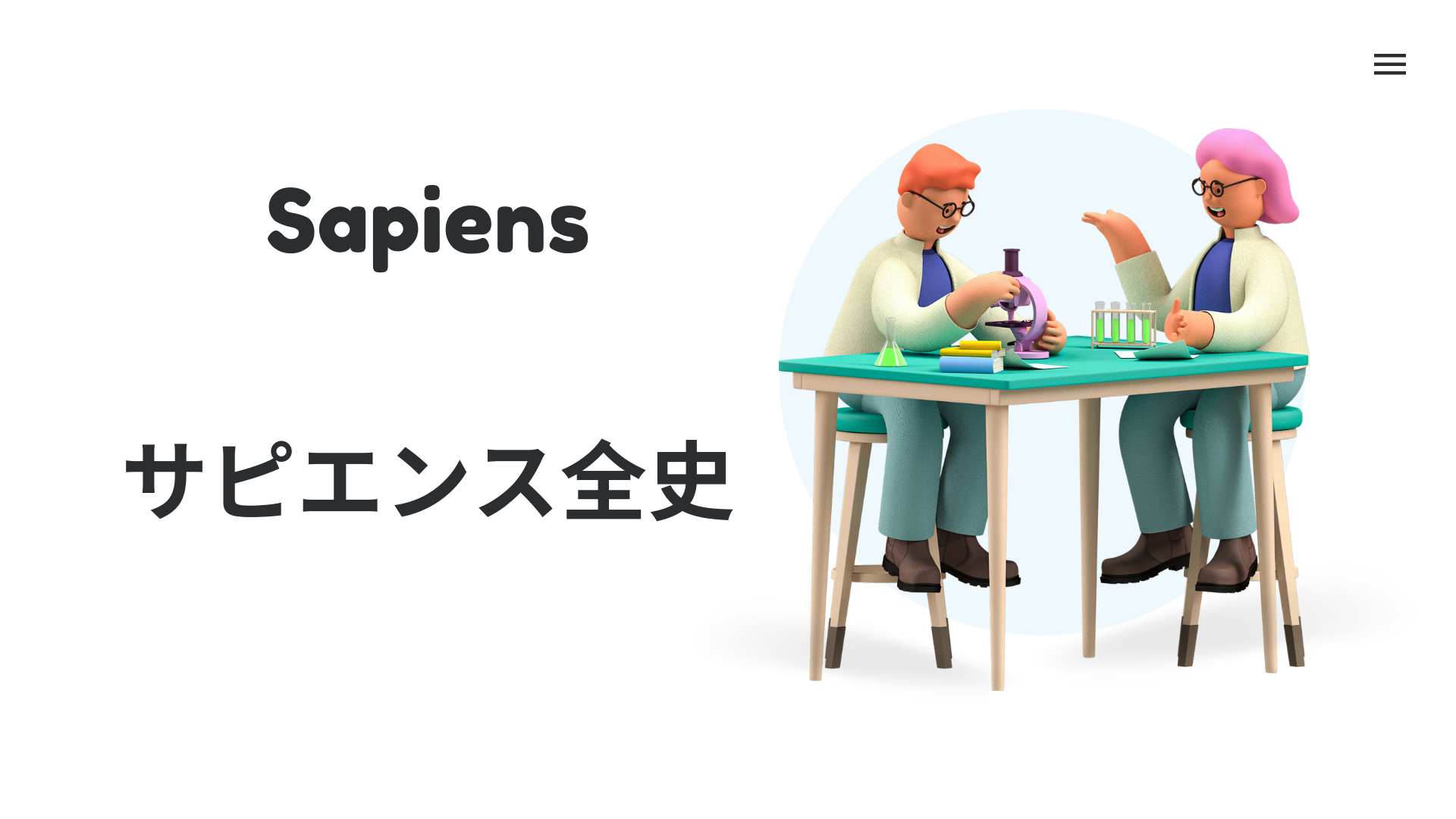
英語でSapiens を読もう📖#3
For English learners!
Hello everyone, how’s your English learning journey going?😃 Reading an English book is sometimes a long journey. You might inadvertently stop if you are alone. But no worries. You are at the right place already. I would like to explore an English book here so that you can try reading the book with me. We are not alone. Let’s enjoy a fun time reading!
The book, which I picked up this time, is called Sapiens, published by Yuval Noah Harari. The Amazon Kindle link below allows you to read up to chapter 3. Today, I am covering chapter 3.
You can check out my recommending strategy of reading as well as a bit of information about this book with a link below. Okay then, let’s get started📖
日本語学習者のみなさん!
みなさん、こんにちは。あずみです。日本語の勉強はどうですか?やさしい日本語で読むのに飽きてきたあなたに、もうワンランク上のリーディングをお届けしたい、ここはそんなブログです。英語部分で私が書いていることを、日本語で書くならこんな感じというのがテーマです。ぜひ、カジュアルな日本語のライティング表現を体験しながら、同時に興味深い本の内容も楽しんでボキャブラリーの幅を広げてくださいね。😃
英語の勉強、はかどってますか?英語の本を読むのって長い旅路ですよね。うっかり止まって挫折してしまうのはとても簡単です。でもこのブログを読んでいるあなたはだいじょうぶ。そんなあなたを応援するのがこのブログです。このブログで私は本を取り上げ、掘り下げていきたいと思いますので、よかったら私といっしょにこの本にチャレンジしてみてください。
今回読む本は、ユヴァル・ノア・ハラリさんの「サピエンス全史」です。本の内容はアマゾンキンドルのリンクから試し読みで確認してみてください。
また、こちらのリンクから英語の本のオススメの読み方について取り上げています📖ぜひ確認してみてくださいね。さぁ、3章を読みましょう。
Ch.3 A Day in the Life of Adam and Eve
第3章 狩猟採集民の豊かな暮らし
Grasp the structure!🦧構成を把握する

To grasp the chapter, you just try to see its hierarchical configuration. I strongly recommend drawing it either physically or virtually.
階層構造を追い、内容を把握します。実際にメモを取りながらするとはかどります。
🚧工事中 🚧
🚧工事中 🚧
🚧工事中 🚧
🚧工事中 🚧
🚧工事中 🚧
Summarize the chapter concisely🦧章を一言でまとめる

To summarize, check the hierarchical configuration and make sentences with important points of each.
階層構造の各部分のポイントを確認して、文にしてまとめます。
Sapiens’ social and psychological characteristics were shaped in the hunter-gatherer era, therefore our post-industrial environment makes us feel alienated, depressed, and pressured. What would be like living as a forager? Pre-agricultural forager society seems to be the original affluent societies than ones we have today. Forager’s mental and spiritual life were based on animism, but their cultural beliefs were only to be guessed. Sapiens had invented sociopolitical codes. Anthropological evidence shows violence and conflicts, meanwhile archaeological evidence shows a wide range of violence rates. Even though what we have and what we can guess are limited, foragers survived for 60,000 years out of 70,000 years of human history. They shaped the world around us to a much larger degree than most people realize.
サピエンスの社会的および心理的特徴は、狩猟採集時代に形作られました。したがって、私たちは産業革命以降の生活環境の中で、疎外感や落ち込み、プレッシャーを感じやすいようです。狩猟採餌者の生活はどのようなものだったのか、農業が始まる前の狩猟採集社会は、私たちの今日の暮らしよりも豊かな社会のように見えます。狩猟採集時代の人々の精神的および霊的な価値観はアニミズムに基づいていたと考えられますが、文化的信念については推測することしかできません。この頃には既に社会政治的規範を構築していたようです。人類学的な考察では、狩猟採集民には暴力と紛争の傾向が見受けられます。考古学的な証拠からは暴力が見受けられる割合の幅はとても広く、多様な社会があったことを知れるのみです。発見されているものから推測できることは限られますが、採餌者は7万年の人間の歴史のうちの6万年生き延びた人々です。彼らの6万年の暮らしは私達の生きるこの世界を、ほとんどの人が理解しているよりもはるかに大きく形作ったと言えるでしょう。
Make questions to discuss🦧ディスカッション用の質問を作ろう

To discuss, make questions. It gives you a great topic to talk about in English.
本について話し合うための質問を作ります。作った質問は英語で話をするときのいい話題になりますよ。
How effective is the presentation in whole or in part? Why did the speaker/author make these choices and how well do they work?
Many possible answers can be found outside of the presentation but it’s a reference.
この箇所は全体の中で/この部分においてどう効果的な役割を果たしていますか?どうして話者はこのような表現をしましたか、またそれはどのように機能していますか?
たくさんの答えが本文の議論の外でひとつの例としてみちびかれる可能性があります。
My opinion: In this chapter, I see the author particularly keep warning that argument about this era is not much based on sufficient evidence and they are rather guesses. What I see is that nevertheless, the author wanted to allocate one chapter for life in the foragers’ era. If you just want to be a cautious scientist, you can choose to stay away from it and ignore the part you are not sure about. On the contrary, the author still wanted to tell the importance to ponder what a life of a forager would be so that readers can guess and think how their time would affect today’s Sapiens life. Personally, his saying was enough for me to understand it is a kind of castle in the air.
私の意見:この章では、著者がこの時代についての議論は十分な証拠に基づいているわけではなく推測であることを警告し続けているのが特に目に付きます。十分な証拠がないとはいえ、著者は採餌採集時代の生活に1つの章を割り当てたいと思っていたように見えます。慎重な科学者でいたいのであれば、各章のないところから離れて、確信が持てない部分をすべて無視することを選択できるでしょう。しかし著者はそうはせず、狩猟採集時代の人々の生活を想像してみることの重要性を説きました。それは、彼等の生活が今日のサピエンスの生活に多くの影響を与えている重要なものなのだということを伝えたかったからだと思います。個人的には、彼の言葉から十分に、この章での議論自体が机上の空論である可能性もありうること理解できました。
five questions for discussion🦧ディスカッション用の5つの質問
How does this make me feel? What does it remind me of?
There are many correct answers that are related to one’s experience; they can be found outside of the text/speech.
この箇所はどんな風に感じますか?何を思い出させますか?
個人の経験に関連するたくさんの答えが本文の外で見つけられることが考えられます。
What does it say?
One correct answer is found in the text.
なんと言っていましたか。
答えは一つです。テキスト内でみつけることができます。
What does it mean? How are the parts connected? what is the reason for people’s actions?
There is more than one possible answer, but the viewer’s opinion is based directly on the text.
ここはどういう意味でしょう?これらの箇所はどう繋がっていますか?この行動にはどんな意味がありますか?
答えは2つ以上考えられますが、質問の答えは本文に直接基づいている必要があります。
What is the message beyond this presentation? What are the greater issues or questions this piece deals with?
The presentation is not directly referenced in the question. There are many possible answers found outside of the presentation, but it’s a starting point.
このトピックが伝える、もっと大きなメッセージはなんでしょう?このトピックの先にどんな大きな問題が見えますか?
この質問は、このトピックと直接リンクする必要はありません。この話の外側にたくさんの答えがあるでしょう。でも、このトピックがいいスタートポイントになります。
How effective is the presentation in whole or in part? Why did the speaker/author make these choices and how well do they work?
Many possible answers can be found outside of the presentation but it’s a reference.
この箇所は全体の中で/この部分においてどう効果的な役割を果たしていますか?どうして話者はこのような表現をしましたか、またそれはどのように機能していますか?
たくさんの答えが本文の議論の外でひとつの例としてみちびかれる可能性があります。
Expressions and terms🦧覚えておきたい単語・表現

Pick some terms that you are unfamiliar with from sentences you high-lightened and memorize them because you need them to discuss this chapter!!
読みながらハイライトした特に重要だと思う文の中から、使い慣れていない言葉を選んで覚えましょう。なぜかというと、ディスカッションで意見や考えを言うために必要になるからです。
| term | example sentence |
|---|---|
| trademark | Such cooperation was one of the important trademarks of Homo sapiens and gave it a crucial edge over other human species. |
| affluent | The wholesome and varied diet, the relatively short working week, and the rarity of infectious diseases have led many experts to define pre-agricultural forager societies as ‘the original affluent societies.’ |
| irretrievable | If the larger picture of ancient forager life is hard to reconstruct, particular events are largely irretrievable. |
| forge | They reveal nothing about the political alliance forged between neighboring Sapiens bands |
| 単語 | 例文 |
|---|---|
| トレードマーク | このような協力は、ホモサピエンスの重要なトレードマークの1つであり、それはホモ属の他の種よりも重要な優位性をもたらしました。 |
| 裕福な | 健康的で多様な食事、比較的短い週労働時間、そして感染症の希少性などを根拠に、多くの専門家は、濃厚開始前の採集社会を「最初の裕福な社会」と定義するようになった。 |
| 復元できない | 古代の採餌者の生活の全体像を再構築するのが難しい場合、特定の出来事はほとんど復元できない。 |
| 形成する | それらは隣接するサピエンスの集落間で形成さられた政治的同盟について何も明らかにしていない。 |
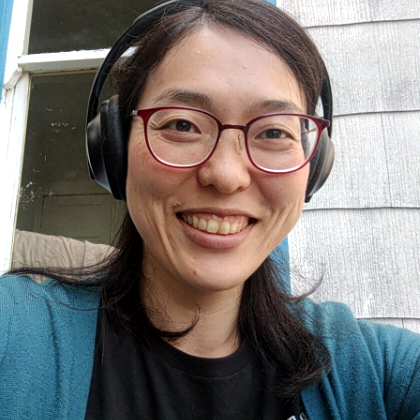
It is often heard that the reason people easily eat too much is that because it is their instinct which was developed in the hunter-gatherer era. I think a lot of people would agree on it, including myself. But how about our depressed, alienated, and pressured feelings? Would they come from the same origin and the discrepancy between the hunter-gatherer environment and the post-industrial one trigger us to feel these feelings? I found this very interesting to think about.
食べ過ぎの理由は、狩猟採集時代に発達した本能だからだとよく言われます。私も含めて多くの人が同意するのではないでしょうか。しかし、私たちの落ち込んだときの気持ちや、疎外されたときの気持ち、そして何かをプレッシャーを感じる気持ち、これらは同じ起源から来ているのでしょうか。狩猟採集社会と脱工業化社会の環境の食い違いがこのような気持ちを表出させるのでしょうか?とても興味深い問いだなぁと思いました。

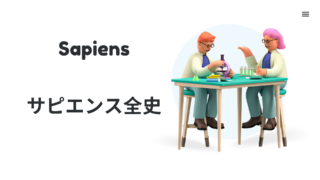

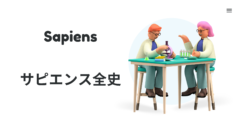
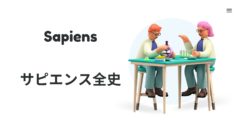
コメント